| February | March | |
| April | May | |
| July | September | |
| October | ||
| November |
Thursday, 2 November 2023
Wednesday, 1 November 2023
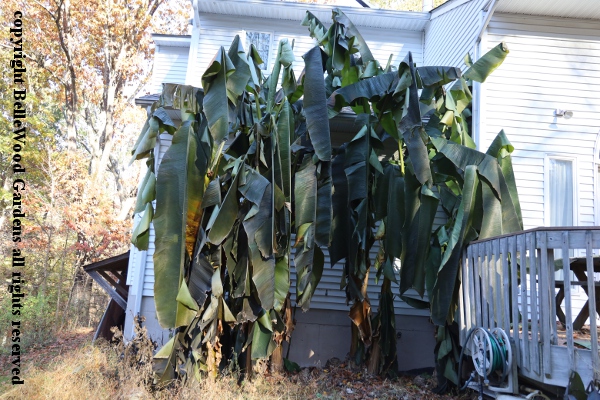
What a difference a day makes, or actually a night. A hard frost with the temperature dropping
down, down, down to 22.5 degrees Fahrenheit . . . tender banana leaves shrivelled, blackened.

Tuesday, 3 October 2023

With attractive spotted purple foliage and lavender flowers, Tinantia pringlei is a deceptively dainty plant
in the dayflower family. Why is it deceptive? Reproducing primarily or exclusively through self-pollination
it is also a common weed of greenhouses. I find easily pulled volunteers in the gravel floor of mine. I do like it.

Saturday, 23 September 2023
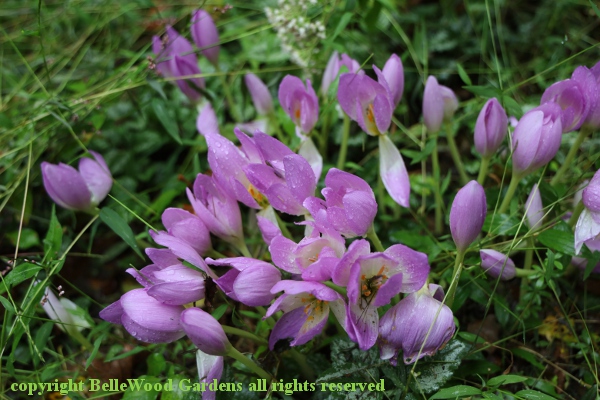
Colchicum are a vigorous bulb flowering in autumn, waiting until spring for leaves,
seed pods in summer. Hence the mistaken common name of "the son before the father."
Sunday, 17 September 2023

Canna 'Bengal Tiger', or perhaps 'Pretoria'. Whichever. A mid-size canna with golden striped leaves.

Lespedeza thunbergii 'Gibraltar' cascades with purple / burgundy flowers in early autumn.
Wednesday, 13 September 2023

It is magical, how the fiery red flowers of Rhodophiala bifida hurl themselves in bloom within a week
of moving out of the greenhouse to where the autumn rains can urge them, "It is time. Now! Flower!"
Thursday, 7 September 2023
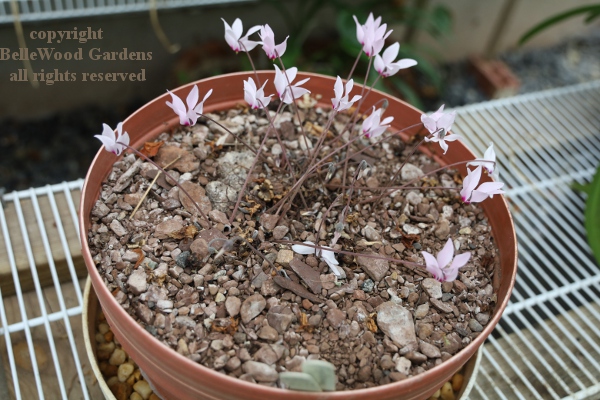
After first offering a pleasant if transient season of typical cyclamen flowers,
Cyclamen rohlfsianum has bold rich dark green leaves through the winter.
Indoors in my greenhouse, of course. Do not overwater, do not overheat.
Wednesday, 26 July 2023
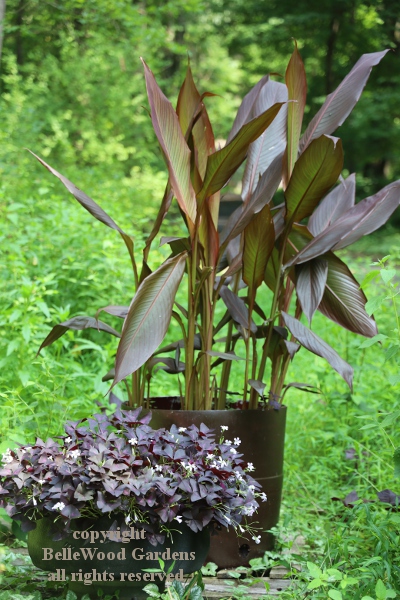
Variations on a theme. A plastic barrel filled with Canna flaccida 'Purpurea'
and a tire planter of Oxalis regnellii 'Purpurea' One is clearly purple while
the other is somewhat tinged with copper. But a nice pairing, do you agree?
Thursday, 6 July 2023

Milkweed, so called for the milky sap it oozes when injured. Caterpillars
of monarch butterflies that feed on the plant ingest glycosides that cause
birds that eat them to become nauseated. Tough for the first one or two but
survival of the species. This species is Asclepias syriaca, common milkweed.


Rain lily, Zephyranthes candida, loves wet soil while actively in growth
Saturday, 27 May 2023

Looking at first glance rather like a Deutzia this is Kolkwitzia amabilis, beauty bush.
Taxonomists have again been at their revisionist games, and in 2013 it was suggested that,
along with a few other genera, Kolkwitzia be merged into an expanded genus, Linnaea.
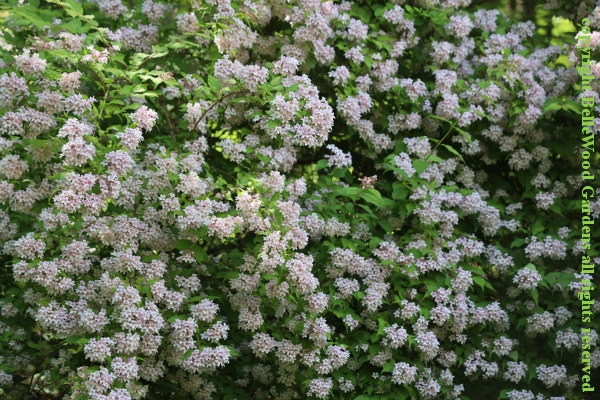
Whatever. This beauty bush seems quite happy to grow here, in lieu of its native Chinese habitat.
Wednesday, 10 May 2023

Rhododendron yakusimanum has a fuzzy indumentum, a hairy layer on the underside of their
evergreen leaves. Which, fortunately, deer seem to find unpalatable and thus dine elsewhere.

Emerging from their winter rest, cut back, heaped with leaves, these
Musa basjoo, Japanese fiber banana, make their appearance. And no,
even if they did flower and produce fruit they are not be suitably edible.
Tuesday, 18 April 2023
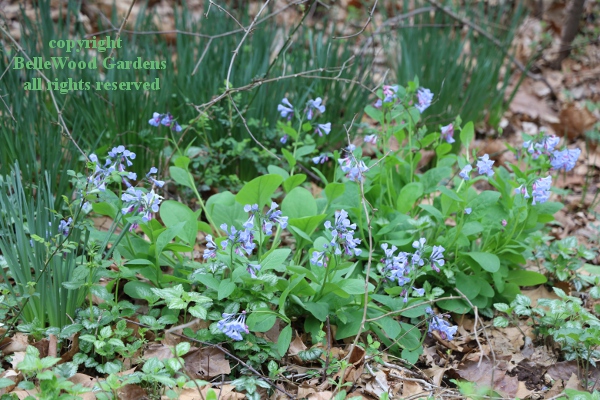
Virginia bluebells, Mertensia virginica, thrive in woodlands just as we'd expect of the natives they are.
Then return underground until the seasons circle back around to spring. Deer don't eat them either.
Saturday, 15 April 2023

Among the later daffodils to flower, Narcissus poeticus and its cultivars are a lovely addition
to woodlands. Crisp white petals encircle a little cup banded red, yellow, green. Fragrant too.

Absent a label I cannot give a name to this charming daffodil. Ah well, it knows who it is.
Wednesday, 5 April 2023
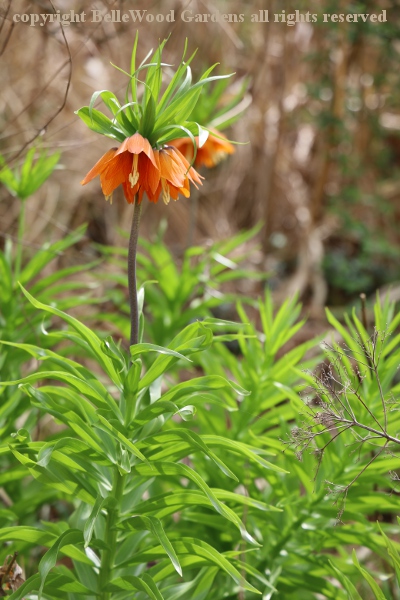
Crown imperial, Fritillaria imperialis. Magnificent flower. Pity is smells rather like a skunk.

Star magnolia with elegant pink flowers, Magnolia stellata 'Rosea'.
Thursday, 16 March 2023

Thursday, 2 March 2023

Helleborus niger and Leucojum vernum, an early perennial and not-a-snowdrop little bulb.
A confusion of the seasons in the naming of these plants. Christmas rose is the hellebore's
common name, and we're well past December 25th. While "vernum" means "if spring, vernal."

These early small bulbs, snowdrops and golden Eranthis hiemalis, winter aconites, spangle the ground.
March is the month when the last of the snow seems to welcome the snowdrops.
Do they all seem the same? Look closely. There are differences.
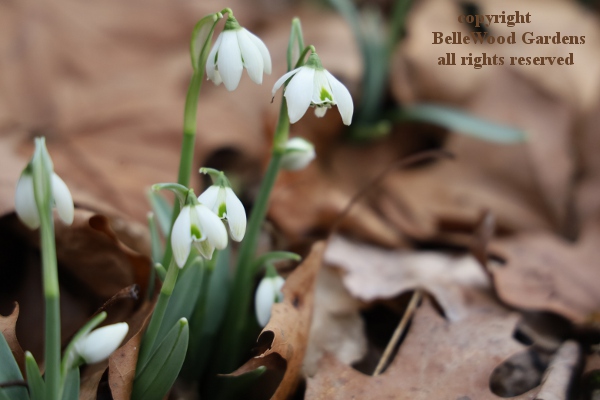
Galanthus 'Hill Pöe' is plump, with extra petals fatly doubled its center.

Galanthus nivalis 'Viridi Apice' is aptly named for the dainty green pencil lines on its outer petals.

While 'Magnet' extends and flares its three outer petals, resembling a helicopter taking off.

Crocus tommasinianus is willing to flower in woodland, unlike most crocus that need full sun.
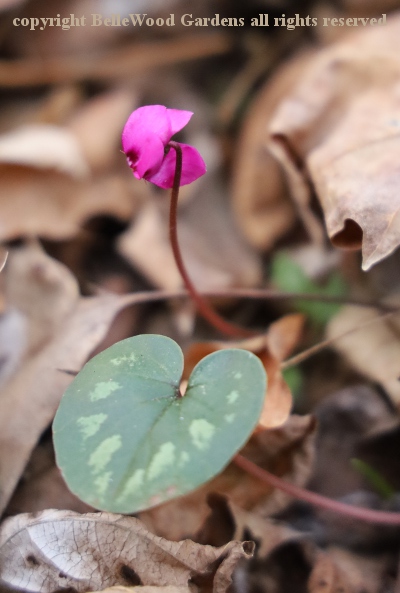
Cyclamen coum is winter green, flowers before spring really arrives, then sleeps away the summer.
Just because this has been a rather mild, basically snow-free winter does not mean flowers have arrived unseasonably early. Small bulbs, food reserves stored underground, hurry into bloom before shrubs and trees leaf out and begin to shade the woodland. But flowers are very welcome, a sign that winter is on the wane and spring is on the way.
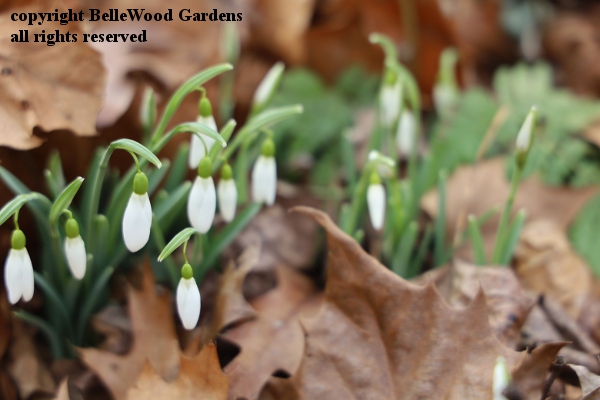
Snowdrops are among the earliest, aptly named schneetropfen, snow piercer, in German.

Next is winter aconite, Eranthis hiemalis. Just see how these have multiplied in my woods.

Understand the the dried up little tubers you plant in the fall are often desiccated
to the point of death. The 20% or so that do survive will happily reseed, as you see.

Daffodils, later than these minor bulbs, are showing growth. And this earliest,
Narcissus 'Rijnveld's Early Sensation' has flower buds pushing up too.
At winter's end it is bulbs that arrive first. With certain perennials also early.
Hellebores are certainly frost proof, like this

Helleborus Early Purple Group. It's one of the acaulescent, stemless species.
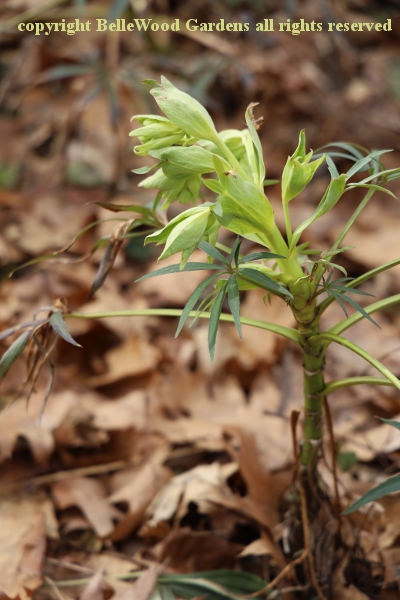
You can easily see the difference in Helleborus foetidus, with its green flowers

clustered at the top of an obvious stem. They were there all winter long.